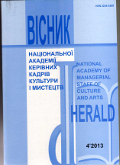Innovation: national scientific reflection
DOI:
https://doi.org/10.32461/2226-3209.4.2013.138019Keywords:
innovation, cultural studies, dissertationsAbstract
The article analyzes the source base research innovations and innovations introduced national dissertations. Attention is focused on the research in the field of art, education, and philosophy. The need for the study of innovation and innovation as a complex socio-cultural phenomena of modern methods of cultural discourse. Social and cultural changes of recent years have caused intensive study multilateral aspects of innovations and innovations in various fields socio-humanitarian knowledge. This is due primarily active shift with changes related to the information and technological innovation, with technical and economic plane in sociocultural. Change of priorities reflected in the fact that if early prognostic concepts were mainly focused on the study of trends in the economic and industrial fields, the current concepts are increasingly affecting the cultural sphere. Therefore, the relevance of the study of innovation and innovation methodology contemporary cultural discourse not objectionable. However, the primary task of the researcher – find and analyze the developments on research, particularly within the domestic science to find the most optimal ways to create own research position, which is not possible without considering and generalizing previous achievements. Recent observations and define the purpose of our study. Separately, not dwelling on the distinction between "innovation" and "innovation" only emphasize that differences do exist, such as the study of innovation has traditionally takes place mostly within the techno-economic sphere. Recently, however, due to the complex and controversial socio-cultural transformations of the concept of "innovation" and "innovation" were widespread in the scientific and theoretical thinking and titles used in all spheres of social and cultural life, which leads to ambiguity database concepts and consequently – to a large number of definitions. Proof of urgent importance of cultural innovation research and innovation, in our opinion, as evidenced by the fact that among the array dissertations on definite issues that were protected in Ukraine over the past 10-15 years, dominated by working with specialty code "economics". They can be found around 70. Most of them uses the term "innovation", which again confirms the fact that a broad approach to understanding such innovations have not yet received a distribution in part due to the close relationship of innovation in the economic sphere. However, the phenomenon of innovation has long crossed the boundaries of technical and economic spheres, as evidenced by its wide use in various fields of human existence – politics, culture, art, linguistics and so on. Then , leave the economic sphere outside our research attention and focus on research and innovation innovations in other fields of scientific knowledge. They can be roughly grouped according to certain blocks. First block: rights and socio- political. The next block – Philosophy. The third block – studies in literature and linguistics. A separate set of these studies in educational sciences, although they are protected under various specialty code. However, education and culture not only mutual correlation. The last block of dissertation research on the issue of innovation and innovation presented work, the most relevant material cultural issues asDownloads
Published
Issue
Section
License
Authors who publish with this journal agree to the following terms:
1. Authors retain copyright and grant the journal right of first publication with the work simultaneously licensed under a Creative Commons Attribution License International CC-BY that allows others to share the work with an acknowledgement of the work's authorship and initial publication in this journal.
2. Authors are able to enter into separate, additional contractual arrangements for the non-exclusive distribution of the journal's published version of the work (e.g., post it to an institutional repository or publish it in a book), with an acknowledgement of its initial publication in this journal.
3. Authors are permitted and encouraged to post their work online (e.g., in institutional repositories or on their website) prior to and during the submission process, as it can lead to productive exchanges, as well as earlier and greater citation of published work (See The Effect of Open Access).


